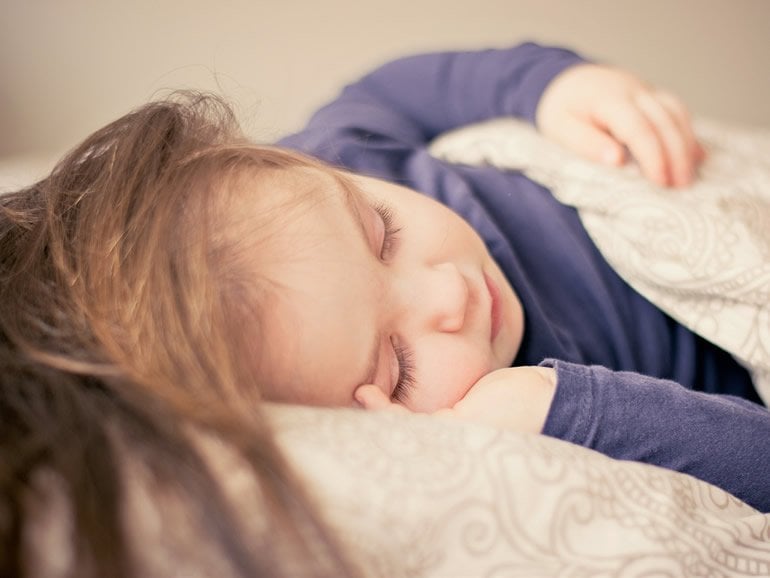Summary: Researchers identified a specific neural network that positively responds to melatonin following concussion in children. Results suggest melatonin may help compensate for normal brain function that has been interrupted due to injury caused by concussion and helps prevent sleep disturbances.
Source: University of Queensland
Melatonin could improve brain functions related to sleep quality in children recovering from concussion, according to a University of Queensland study.
Using the latest brain mapping techniques, researchers examined Magnetic Resonance Imaging (MRI) scans from 62 children before and after taking melatonin or a placebo in a randomised clinical trial.
Child Health Research Centre’s Dr Kartik Iyer said the study revealed that concussed children who received 3mg or 10mg of melatonin over a four-week period experienced significant improvement in whole-brain function and grey matter – brain regions which are essential for sleep control and cognition.
Dr Iyer said the MRI scans enabled the team to rapidly assess millions of neural connections to help guide treatment response.
“We identified a specific “network” of brain connections that positively responded to melatonin treatment, compared with placebo,” Dr Iyer said.
“The results suggest melatonin, when taken by children with concussion, compensated for normal brain functions that may have been interrupted due to injury.”
One of the most common complaints after childhood concussion is sleep disturbance and fatigue, which can persist for years.
Dr Iyer said this could have a detrimental effect on brain function and anatomy and potentially hinder progress to normal development.
“A good night’s sleep is essential for children as it allows them to consolidate what they’ve learned throughout the day and restore energy for the day ahead,” he said.

“Our study shows that melatonin, when taken orally over several weeks, may reduce sleep disturbances and improve sleep quality.”
However, the team found solving sleep problems may only be part of the answer in aiding recovery.
“A surprising aspect of the study was that not all children made a full recovery from concussion just by taking melatonin,” Dr Iyer said.
“Even though increases in brain functions and grey matter corresponded with decreases in sleep disturbance and fatigue, the supplement didn’t resolve other common concussion symptoms such as memory problems, anxiety and depression.”
Parents are advised to consult their doctor or neurologist if their child is having sustained sleeping problems following a concussion to assess their suitability for short-term use of melatonin.
About this neurology research article
Source:
University of Queensland
Contacts:
Kartik Iyer – University of Queensland
Image Source:
The image is in the public domain.
Original Research: Closed access
“Neural signatures of sleep recovery following melatonin treatment for pediatric concussion” by Dr. Kartik Iyer, Dr. Andrew Zalesky, Dr. Luca Cocchi, and Dr. Karen Maria Barlow. Journal of Neurotrauma.
Abstract
Neural signatures of sleep recovery following melatonin treatment for pediatric concussion
Evidence-based treatments for children with persistent post-concussion symptoms (PPCS) are few and limited. Common PPCS complaints such as sleep disturbance and fatigue could be ameliorated via the supplementation of melatonin, which has significant neuroprotective and anti-inflammatory properties. This study aims to identify neural signatures of melatonin treatment with changes in sleep disturbances and clinical recovery in a pediatric cohort with PPCS. We examined structural and functional neuroimaging (MRI) in 62 children with PPCS in a randomized, double-blind, placebo-controlled trial of 3mg or 10mg of melatonin (NCT01874847). The primary outcome was the total youth self-report Post-Concussion Symptom Inventory (PCSI) score after 28 days of treatment. Secondary outcomes included the change in the sleep domain PCSI score and sleep-wake behavior (assessed using wrist-worn actigraphy). Whole-brain analyses of (i) functional connectivity (FC) of resting-state fMRI, and (ii) structural grey matter (GM) volumes via voxel-based morphometry were assessed immediately before and after melatonin treatment and compared to placebo in order to identify neural effects of melatonin treatment. Increased FC of posterior default mode network (DMN) regions with visual, somatosensory and dorsal networks was detected in the melatonin groups over time. FC increases also corresponded with reduced wake periods (r=-0.27, p=0.01). Children who did not recover (n=39) demonstrated significant FC increases within anterior DMN and limbic regions compared to those that did recover (i.e. PCSI scores returned to pre-injury level n=23) over time, (p=0.026). Increases in GM volume within the posterior cingulate cortex were found to correlate with reduced wakefulness after sleep onset (r=-0.32, p=0.001) and sleep symptom improvement (r=0.29, p=0.02). Although melatonin treatment did not improve PPCS overall clinically, our study finds that melatonin treatment significantly improved subjective and objective sleep parameters with related function-structure relationships within and between brain regions interacting with the DMN.






